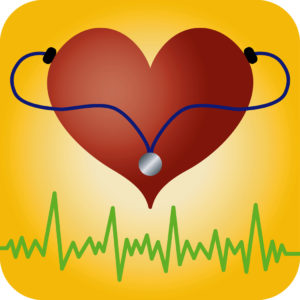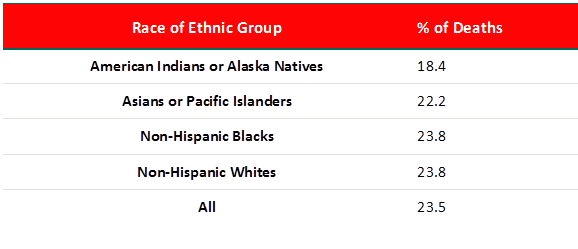Heart Disease in the United States
- About 610,000 people die of heart disease in the United States every year–that’s 1 in every 4 deaths
- Heart disease is the leading cause of death for both men and women. More than half of the deaths due to heart disease in 2009 were in men
- Coronary heart disease (CHD) is the most common type of heart disease, killing over 370,000 people annually
- Every year about 735,000 Americans have a heart attack. Of these, 525,000 are a first heart attack and 210,000 happen in people who have already had a heart attack
Heart Disease Deaths Vary by Race and Ethnicity
Heart disease is the leading cause of death for people of most ethnicities in the United States, including African Americans, Hispanics, and whites. For American Indians or Alaska Natives and Asians or Pacific Islanders, heart disease is second only to cancer. Below are the percentages of all deaths caused by heart disease in 2008, listed by ethnicity.
Early Action is Important for Heart Attack
- In a 2005 survey, most respondents—92%—recognized chest pain as a symptom of a heart attack. Only 27% were aware of all major symptoms and knew to call 9-1-1 when someone was having a heart attack.5
- About 47% of sudden cardiac deaths occur outside a hospital. This suggests that many people with heart disease don’t act on early warning signs.
Morbid Obesity and Heart Disease
A study by Johns Hopkins researchers of more than 13,000 people has found that even after accounting for such risk factors as high blood pressure, high cholesterol and diabetes, so-called morbid obesity appears to stand alone as a standout risk for heart failure, but not for other major types of heart disease.
In a report on the research, published online in the Journal of the American Heart Association, the Johns Hopkins team says morbidly obese individuals were more than two times more likely to have heart failure than comparable people with a healthy body mass index, after accounting for high blood pressure, cholesterol and blood sugar levels. And yet, after accounting for these factors, people with morbid obesity weren’t any more likely to have a stroke or coronary heart disease — basically disease of the heart’s arteries,” due in part to inflammation and an accumulation of plaque in the heart and surrounding blood vessels.
The federal government estimates that one in three Americans is obese and more than 5 percent are morbidly obese — defined as a body mass index of greater than 35. According to the U.S. Centers for Disease Control and Prevention, almost 6 million people in the United States are living with heart failure, a condition of aging marked by enlarged and/or weakened heart muscle and diminished blood-pumping efficiency, resulting in shortness of breath, fatigue, weakness, trouble breathing when lying down, and swelling in the ankles and feet.
Overall, there is a 50 percent mortality rate for people with heart failure five years after diagnosis.
“Obesity in our study has emerged as one of the least explained and likely most challenging risk factors for heart failure because there is no magic pill to treat it, no drugs that can easily address the problem like there are for high cholesterol and high blood pressure,” says Chiadi Ndumele, M.D., M.H.S., assistant professor of medicine and member of the Ciccarone Center for the Prevention of Heart Disease at the Johns Hopkins University School of Medicine. “Even with diet and exercise, people struggle to lose weight and keep it off, and for the morbidly obese, the struggle is often insurmountable.”
Although it isn’t completely clear why obesity alone is linked to heart failure independent of risk factors and not to stroke or coronary heart disease, Ndumele says that there is evidence to suggest that extra body weight exerts a higher metabolic demand on the heart and that fat cells in the abdomen may even release molecules toxic to heart cells.
You can find the report here: https://www.ahajournals.org/doi/full/10.1161/jaha.116.003921
References:
www.hopkinsmedicine.org
https://www.cdc.gov/heartdisease/facts.htm

